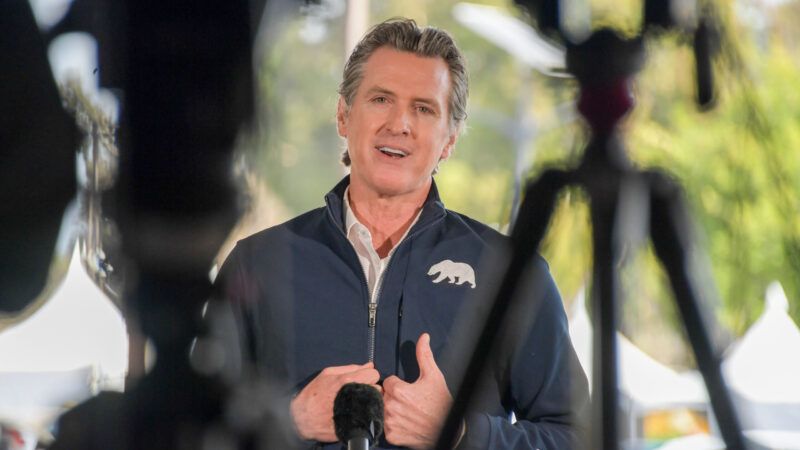Recall Elections Give California Voters a Needed Check on Governors Who Abuse Their Power
California Gov. Gavin Newsom hasn't committed any crimes, but he deserves to face a potential recall for his disastrous handling of the COVID-19 pandemic.

As opponents of Gov. Gavin Newsom come closer to placing a recall on the ballot, some pundits have argued that voters should only boot a sitting politician for grievous misbehavior such as crimes and malfeasance. "Recalls should be reserved for elected officials who are corrupt or extremely incompetent," as The San Diego Union-Tribune recently opined.
That view is wildly at odds with how Gov. Hiram Johnson—the progressive governor who ushered in our state's initiative, referendum, and recall process—conceived it. "Suffice it to say, so far as the recall is concerned, did the solution of the matter rest with me, I would apply it to every official," Johnson said in his first inaugural address in 1911. Yes, he would have applied it to every officeholder.
Sure, our nation's founders were skeptical of direct democracy given their fear of mob rule. In "Federalist No. 10," James Madison worried that unchecked democratic passions would "wrest the scepter from reason." He had a point, but I've warmed to California's system for practical reasons and have edged much closer to Johnson's position.
While a (small-r) republican system that disperses powers with legislators is best, we're stuck with reality. California's poor level of representation and lopsided legislative districts make it tough to provide adequate checks and balances. For instance, each California Assemblymember represents more than 480,000 people—compared to around 3,200 people in New Hampshire. Without direct democracy, our leaders face little pushback.
Recent events highlight what Johnson was saying, especially during the pandemic. The governor has issued more than 400 executive actions on wide-ranging matters without any effective check on his muscle-flexing. The courts have reined in some of these edicts, but the governor continues to issue arbitrary orders that affect our livelihoods and freedoms. They seem based on gut feelings rather than science and he keeps moving the goalposts.
The Legislature has been like a deer in the headlights, standing idle as the governor rules by fiat. The only thing that has grabbed Newsom's attention has been the steady collection of recall signatures. Recall backers need signatures equal to 12 percent of the votes last cast for that office. They've recently surpassed that 1.5-million-vote threshold—but still need around 400,000 more to assure certification. The deadline is March 17.
After the recall gained well-heeled Silicon Valley backers, Newsom relaxed California's stay-at-home rules. The same "science" that mandated continued lockdowns had changed and "outdoor dining and worship services were OK again, hair and nail salons and other businesses could reopen, and retailers were allowed more shoppers inside," according to an AP report. The administration even lifted the veil of secrecy from its decision-making.
Republicans pounced on the change of heart. "He is losing political support up and down the state," said Assemblyman Jim Patterson (R–Fresno). The governor strongly denied that his policy changes had anything to do with the burgeoning campaign, but politicians rarely select a tie without considering its political ramifications. Sadly, the smart money is that the state's hapless GOP will squander this opportunity.
San Diego's former Mayor Kevin Faulconer, a fiscally conservative moderate who seems like a good fit for a state with Democratic majorities, has thrown his hat in the ring. He will run a "California comeback" campaign that focuses on the state's high poverty rates, poor schools, crumbling infrastructure, and debilitating business climate.
But John Cox, who may be on track to become the Harold Stassen of California politics (Google it), has run an ad that attacks Faulconer for some office-space deal in San Diego. Anyone should feel free to run, but Cox garnered only 38 percent in his matchup with Newsom in 2018. You'd think he would tout whatever benefits his candidacy brings to the table, rather than tear down a fellow Republican at this early stage.
The recall ballot contains two separate questions. The first is "yay or nay" on the recall itself and the second is to name a replacement. Voters recalled Gov. Gray Davis in 2003 amidst rolling electricity blackouts, a vehicle-license-fee hike and soaring deficits. The ballot featured 135 candidates, some of whom were unusual (e.g., Hustler publisher Larry Flynt and actor Gary Coleman). Only a handful, though, received a consequential number of votes.
Democrats tried to unify against the recall, but then-Lt. Gov. Cruz Bustamante entered the race. Obviously, Arnold Schwarzenegger won by a large margin. If another Democrat breaks ranks and pulls a Bustamante and Republicans have a crowded field without a celebrity, California could recall its governor and replace him with someone even further to the left.
I'm still not sure whether Californians who are frustrated with Newsom's heavy-handed pandemic leadership should strike while the recall is hot—or prepare for the regularly scheduled election. Either way, I agree with Hiram Johnson. Every officeholder should always fear a potential recall—and for any reason that suits the public.
This column was first published in The Orange County Register.
